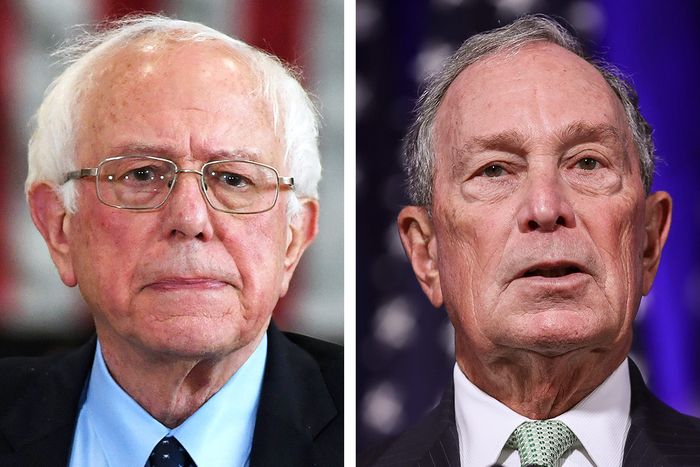
Michael Bloomberg and Bernie Sanders have some superficial similarities in background: They are both highly accomplished Jewish men in their late 70s who have spent their lives bouncing around the northeastern quadrant of the country. But now that they are both competing for the Democratic presidential nomination, another similarity that’s not so superficial is worthy of reflection: Bernie and Mike have both spent most of their long careers in and around politics avoiding any identification with the Democratic Party.
Sanders’s antipathy to the Democratic brand is open and notorious. Dating all the way back to the 1970s, Sanders ran for office as either a progressive third-party candidate or as an independent (though sometimes with Democratic backing). Last year, anticipating his 2020 presidential campaign, he signed a “loyalty oath” required by the Democratic National Committee attesting to his membership in the party. But it was a gesture clearly made under duress. And while Sanders’s refusal to self-identify as a Democrat made sense in the distant past when the party still included a lot of Joe Biden’s segregationist friends, the ideological realignment of the parties was consummated decades ago, making Democrats the clear-cut left-of-center party in what is still a two-party system. It’s no mistake, then, when both friends and enemies of the Sanders political enterprise speak of his presidential candidacy as representing a “revolution” or a “party takeover.” It’s an insurgent campaign from outside the party aimed at transforming it, not merely a vehicle for progressives within the party.
As a very wealthy man operating at the highest levels of Wall Street, Michael Bloomberg habitually gave money to politicians in both parties. But as a politician himself, he emphatically identified with the GOP, as Politico noted recently:
Michael Bloomberg’s debut 2020 campaign ad touts that he “took charge” of New York in the wake of 9/11.
What Bloomberg doesn’t mention: He leaned heavily on an endorsement from Rudy Giuliani, the then-New York mayor who is now President Donald Trump’s personal attorney, to win that post. Bloomberg trumpeted his support in TV advertising and direct mail, chastising his Democratic opponent for being “no friend of Rudy Giuliani.”
Giuliani is just one of many skeletons in Bloomberg’s partisan closet. As he pursues the Democratic presidential nomination, he’ll have to explain the millions he’s spent putting Republicans into office, including contributions backing more than a dozen current and former members of Congress … [He] endorsed George W. Bush’s 2004 reelection campaign, contributed to John McCain and even held a fundraiser for a House GOP member as recently as last year.
Bloomberg won three mayoral elections in New York running on the Republican ballot line (though he self-identified as an independent in his last race in 2009). And ranking down there with the Bush endorsement in the eyes of Democrats was his very heavy responsibility for the reelection of Republican Senator Pat Toomey of Pennsylvania in 2016, as the New York Times recalled:
The former mayor of New York poured in $11.7 million to help re-elect the Republican incumbent, Senator Pat Toomey, who had led an effort, albeit unsuccessful, to expand background checks for gun purchasers, a top priority of Mr. Bloomberg’s.
Mr. Toomey won by less than two percentage points, handing a key victory to the Senate majority leader, Mitch McConnell: The Republicans held on to control of the chamber by two seats. At the time, it was the most expensive Senate race the country had ever seen, and Mr. Bloomberg’s money was one of the largest influxes of outside influence.
Aside from his heretical support for a marginal improvement in background checks, Toomey is a conventional conservative Republican who has supported Trump on 87.5 percent of Senate votes, voted to confirm Brett Kavanaugh, and helped draft the Trump tax cut and Obamacare repeal legislation. Pennsylvania Democrats don’t seem very jazzed about Bloomberg’s candidacy.
All of this history is relevant because an increasingly plausible scenario for the 2020 Democratic presidential contest is a slash-and-burn Sanders winning streak in the early primaries that devolves into a one-one-one clash with Bloomberg in and after Super Tuesday, in states where the multibillionaire is spending absolutely unprecedented amounts of money and is steadily raising his poll standings (already, and while ignoring the early states, he’s in fourth place, less than three points behind Elizabeth Warren and more than three points ahead of Pete Buttigieg, in the RealClearPolitics national polling averages). There are certainly enough Bernie-hating and Bernie-fearing Democrats out there to give the ex-Republican some cover if he’s the last obstacle standing to a lefty “political revolution.” And at the same time, it’s hard to imagine a more galvanizing foil for the Sanders campaign than a multibillionaire who’s built a financial and media empire on and near Wall Street.
So here’s the irony: At a time of maximum partisan polarization in American politics, and out of a vast field of over 20 candidates, Democrats in much of the nation may soon choose a presidential nominee from a remaining field of two men who are only Democrats with a large asterisk next to their name. The survivor would then go up against a president with his own shaky history with the Republican Party that is now totally in his thrall. It’s enough to give hardcore party loyalists a headache.






























